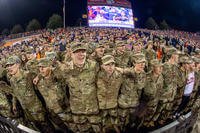Calling Home
You'll have several chances during basic training to call home, but making a phone call is not a right. It's a privilege that has to be earned.
Because calling home is an earned privilege (for your group) and is different for everyone depending on how your basic training unit performs, you may get only one phone call during your entire time at basic, or you may get as many as eight or 10 chances to call home. There's just no way to tell.
Generally, your first phone call lasts a few minutes, giving you just enough time to say, "I love you, and here's my mailing address." The instructor will give you a time limit on your phone calls. Your group travels to the phone area where you must wait in line for your turn.
How many calls you're allowed to make, how much time you get and where the phone area is (indoors or outdoors) depends on which branch you're in.
Hearing from Home: Mail Call
In basic training, mail call is everyone's favorite time of day, except for the days when they don't get mail.
Letters from Home
When I was in Air Force basic training (about 100 years ago), I didn't receive any mail for the first four weeks. I was in a low, low place.
Then one afternoon, the training instructor performed mail call and called my name 18 times! It seems that for some reason, my mail had gotten lost in the system and apparently spent a significant amount of time sitting on someone's desk before he finally determined who I was and where I was and got my mail to me.
Unfortunately, I was performing dorm guard duty at the time, and you're not allowed to read mail during mail call. When I got off dorm guard duty, it would be time for lights out, and you can't read mail after lights out, either. My first chance to read mail wouldn't be until the next evening's mail call period.
However, my TI noticed that this was the first mail I'd received in basic training, and because more than four weeks had passed, he took pity on me. Right after mail call, he took me to the side and said, "Powers, I'm taking the flight outside for a little drill practice. We'll be gone about 45 minutes. Remember, you're not allowed to read any of that mail while we're gone, OK?" Then, he winked at me. That was the first time I realized that my TI was really an OK guy and not the ogre I thought him to be.
Mail call is usually every evening, Monday through Saturday. At the end of the duty day, the drill instructor will enter the barracks, call out names and pass out mail. You're then usually granted about one hour of free time to read your mail. If you read fast, you may even have a few extra minutes to write a quick letter back.
Ask your family, friends and loved ones to send you lots of mail during your time in basic training. I can't emphasize enough how much hearing from home helps, even if you don't have much free time available to answer. Also, be sure to ask for written mail only. Do not ask for items such as food, money and prohibited items (which will be addressed when you arrive at basic training).
Meeting Your Battle Buddies
In basic training, you will be put under more stress and for a longer period of time than you have experienced during your entire life. Unfortunately, this type of stress provides fertile ground for improper behavior, such as running away (AWOL).
To combat this problem, the services make sure that you're never, ever alone during basic training. One of your classmates will be assigned to be your battle buddy. Your battle buddy will be your best friend from the very first day of basic training to the very last day.
From Basic Training for Dummies, copyright © 2011 by Wiley Publishing, Inc., Hoboken, New Jersey. Used by arrangement with John Wiley & Sons, Inc.
Interested in Joining the Military?
We can put you in touch with recruiters from the different military branches. Learn about the benefits of serving your country, paying for school, military career paths and more: sign up now and hear from a recruiter near you.












